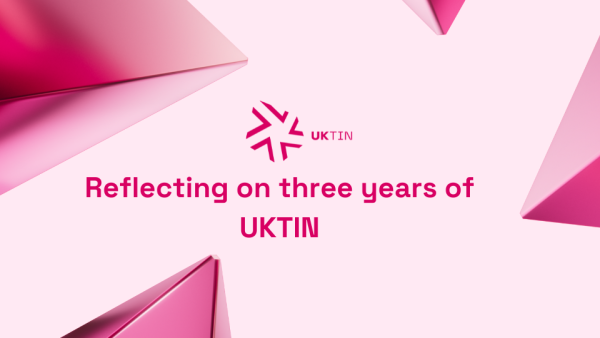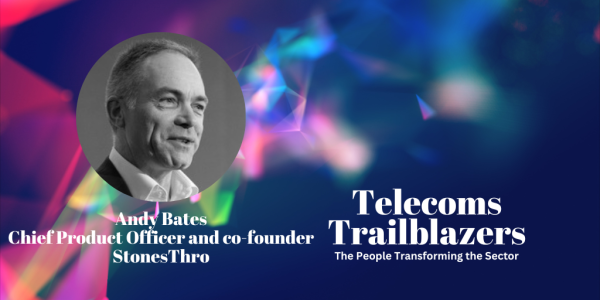Designed to be an informal conversation that provides a glimpse behind the scenes, UKTIN speaks to the consortium about activities of the last three months, focusing this time round on the official launch of UKTIN.

UKTIN has now officially launched. What have you learned?
Nick Johnson, Head of UKTIN: “That the ecosystem gets it. To be honest, I was terrified pre-launch that we’d have this fantastic event, people would listen politely and then slope off at half-time to say, “Nice lunch, but so what?” I needn’t have worried. People stayed to the end and beyond. A network to serve telecoms innovation meets a clear pent-up demand.”
Mario De Miguel Ramos, Cambridge Wireless: “The response to the launch has been excellent. To see over 200 people in attendance - who were very excited about the plans and strategies of UKTIN - was remarkable. The importance of offering guidance and advertising funding opportunities has been a real learning curve. Our community, particularly SMEs, want to use the network as a toolkit. Let's remember that.”
Kishan Nundloll, Digital Catapult: “I have seen first-hand the increased engagement from the ecosystem with UKTIN, and have been blown away by the positive and forthcoming nature of the industry. We've been able to work directly with the community to understand what they would like to see UKTIN working on. And of course advise them on the multitude of ways they can get involved, especially as we have now launched our first wave of Expert Working Groups focused on AI, Wireless Technologies, Security and Non-Terrestrial Networking. Seeing the enthusiasm and excitement Chairs and members have brought to initial meetings gives me renewed optimism that we are very much on the right track.”
Jon Hunt, University of Bristol: “Within the UKTIN community we have been working on an R&D capability database – and we have learned just how complex the ambition of the database is. However, we have a roadmap for its development, in stages that will make its first release by Autumn this year.”
Lesley Holt, WM5G: “The launch event was brilliant for us. WM5G made so many contacts, and it gave us a platform to encourage more people. We’ve had a great response for UKTIN Talent, and have lots of additional sign-ups for UKTIN Clusters. Delving deeper into where we want to lead was helpful, allowing us to hone in on the key priorities. Since then, for example, we have launched the UKTIN Talent Advisory Group.”
What has your organisation been working on since?
Johnson: “The consortium is firing on all cylinders now, as you’ll read below. Gratifyingly, DSIT has extended the scope of the project to include significant new elements on Adoption and Standards - a couple of extra cylinders to get the spark plugs screwed into.”
Ramos: “Our marketing and events teams are rapidly evolving, and there has been a lot of activity. CW has also significantly ramped up its communications (engaging with media and launching outreach programmes); pushed the Supplier Specialist Guidance Service, which has become increasingly important over the last quarter; provided support to the ONE Competition; and had valuable discussions about international strategic goals, honing in on the right territories and companies to support. We are particularly proud of our work to help DSIT and companies in their matchmaking efforts to build consortia for the ONE competition. This is a great example of the tangible impact we can deliver to the ecosystem. Ultimately, we hope this work will help drive even greater innovation throughout the UK.
Nundloll: “We have been focused on creating and raising the appropriate forums and spaces to start working with the ecosystem. This will enable us to drive UKTIN to be as successful as first envisaged.”
Hunt: “Our Innovation and Investment Support programme is now live. The first Workouts took place in June and were really well received by the 20+ participants. This is specialist support for early-stage telco (and connected sectors including AI, quantum and space) companies to help develop their business models for growth, discover emerging opportunities in the UK telecoms market, position themselves to attract the right investors and plan a successful investment campaign. Spread the news in your networks. We have further dates throughout 2023.
The UKTIN Innovation Platform is also live, and we have 70+ active members. This dynamic online space is designed to support early-stage R&D-intensive telecoms companies to navigate the ecosystem, make peer-to-peer connections, and access exclusive opportunities, events and funding calls. If you haven’t already, make sure you sign-up for the Platform here. We welcome all members of the UKTIN ecosystem. Furthermore, thanks to our volunteers, there’s been good progress with the Expert WorkingGroups Bristol is supporting, with both the AI and Security groups holding their inaugural meetings. The Optics group will launch next – and is currently recruiting volunteers.”
Holt: “In June, WM5G launched the UKTIN Talent Advisory Group. To get to this point, we conducted around 65 interviews with a range of stakeholders. Our objective was to gain insight. We knew there was a skills gap but we wanted to talk to the people impacted by this. We have kicked off an ambassadors programme because a lack of diversity cropped up repeatedly and the figures, of course, are pretty well-known: only 3% of women are in telecoms engineering roles. So far, our focus has been on the gender gap - for example, we worked with the marketing team for International Women in Engineering Day - but we will broaden this. We also attended our first careers fair, engaging with 1200 students, which gave us crucial knowledge of scale. As for UKTIN Clusters, we managed to kick it off in March, two months earlier than planned; we have had three meetings to date, and Mario and his team joined for the most recent, offering advice for attracting investors from across the regions; this was incredibly helpful, and shows the importance of collaboration, facilitated by UKTIN.
Has anything within the telecoms ecosystem caught your attention?
Johnson: “Something that caught my eye from the off was the emerging innovation around direct satellite-to-handset coverage. People like to predict that innovation is over in telecoms but here’s a timely reminder that there’s always something new under the sun.”
Ramos: “Three and Vodafone are one step closer to merging in the UK, which is big news. This is highly relevant. We now have one less MNO in the UK, something to take note of and consider.
Nundloll: “Seeing the increase in excitement to recent DSIT surveys and thoughts on the future of telecoms. The way the industry is looking to collaborate has been especially eye-catching.”
Hunt: “There have been two events in Bristol’s telecoms ecosystem that caught my attention. The University of Bristol’s Smart Internet Lab Conference 2023: Catalysing Future Networks Research in the UK (28-29 June) was informative, impressive and very well attended. Have a look at the LinkedIn Post from Weaver Labs here. Also, the University’s Festival of Enterprise (7 July) was well-supported by businesses from the City and region – further information is available here. Conference discussions included the collaboration experience between industry and academia, with participation from Oracle and BT. Further collaboration between BT and the Smart Internet lab on AI & Machine Learning research was discussed in the panel sessions and questions from the audience suggested there was substantial interest in matchmaking the interests of companies and the academic, so a clear role for UKTIN.”
Holt: “I think it’s started to really hit home that we have a lot to do in terms of rebranding the sector. Telecoms is not considered an attractive industry. It is incumbent on us to do what we can, show that it is exciting and where telecoms can take you. We want people to join us in the future.”
What can the UK expect to see over the next quarter?
Johnson: “We will be delivering the ONP event on behalf of DSIT, bringing together the FRANC and ONE competition projects in a passing of the torch, so to speak. All of our Expert Working Groups - including the new Standards Working Group - will be up and running, and the Adoption programme will be underway, with renewed content on the website and the recruitment of the vertical working groups. The Research Capability Discovery Service will launch its basic service and will be well on the way to the full-service offer.
Alongside this, our existing services will continue to accelerate: the Specialist Supplier Guidance Service, both domestically and internationally; the Innovation and Investment Workouts; the UKTIN Clusters and Talent programmes; and our marketing and dissemination services.
All the links in the chain are now in place. From IPR and Standards to Academia through to SMEs, large vendors and operators, signposting for funding and financing, go-to-market, skills and training, deployment and adoption, telecoms innovation in the UK now has a network.”
Ramos: “Our goal is to continue and accelerate the Supplier Specialist Guidance Service. We also hope to expand our international activity, both from the communications and the Specialist Guidance perspective. And from September, you can expect plenty more events and UKTIN presence at the most relevant telecoms exhibitions and conferences. We’ve been discussing with partners about promoting UKTIN within venture capital firms, for example. We will be looking to bring more and more people together.”
Nundloll: “I think across all the partners it will be more of the positive collaboration we have seen in the last quarter and for UKTIN to continue to engage with the ecosystem, with our primary aim of increasing exposure in the R&D sphere. We'll be working on disseminating the outputs of the Expert Working Groups and progressing the Strategic Working Groups, as we continue to raise our profile and build into the current ecosystem.”
Hunt: “The Optics Communications & Photonics Expert Working Group (EWG) will launch next quarter, joining the other established Expert Working Groups. The team is working hard on the recruitment of volunteer experts for the core network optics technology because there are currently far fewer deployments of these solutions, compared, for example, to the likes of wireless and radio. However, these are critical parts of our ecosystem and need to be well represented.”
Holt: “Within the Talent side of things, there is a lack of information on the range of roles and career opportunities within the sector; we want to create data sheets and explain key roles through compelling story-telling. As for Clusters, we have collected data and published an in-depth piece of work with the Scotland 5G Centre to validate their information but hope to showcase this research further over the next quarter before reaching out to other regions and nations to undertake a similar exercise. Another focus will be engaging in career talks and perhaps most importantly, learning how to scale our activity to reach a wider audience. We need to be smart about this. We’re thinking of high-profile events, which is exciting. There is plenty to look forward to.”









